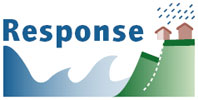Responding to the risks from climate change
Achieve a framework for understanding and preparing for the impacts of climate change around the European coastline (RESPONSE)

Background
‘Response’ (or ‘Responding to the risks from climate change’) is a three-year Project supported by the LIFE financial instrument of the European Community, completed in December 2006. The Project provides a framework for understanding and preparing for the impacts of climate change around the European coastline
Purpose
The aim of the Project is to assist organisations managing the coastline in assessing and prioritising the risks arising from climate change impacts on natural hazards, to inform the planning process. It will allow local and regional authorities and other coastal stakeholders to recognise areas of increasing risk due to climate change and to identify potential solutions.
Methods
The Project approach is based on the sensitivity of different coastal landforms to change, the likelihood of change, and the consequences of change in relation to the vulnerability of the developed environment and the pattern of population.
The typical response patterns of different landforms can be identified as ‘Coastal Behaviour Systems’, which can be recognised right around Europe’s coastline.
Climate change ‘hotspots’ can be identified where particular attention may be required to manage increasing levels of coastal risk.
Results
The Project has demonstrated regional-scale mapping of coastal evolution and risks, taking account of the impacts of climate change. It has also examined the current and future costs of coastal natural hazards, to encourage cost-effective solutions. Nine Partner organisations in the United Kingdom, Italy, France and Poland have participated, led by the Isle of Wight.
Products
- Summary Leaflet
- Training Pack: detailing the RESPONSE mapping methodology
- Good Practice Guide: providing global and European examples of good practice in coastal risk management
- CD-Rom: containing a resource of supporting case studies and investigations
- DVD Film: a 15-minute film introducing the subject of coastal risks in a changing climate, and presenting the potential of the RESPONSE Project publications for use in coastal zones around Europe. Filmed in the UK, France and Italy.
- Proceedings of the International Conference on: Landslides and Climate Change – 21-24th May 2007, Ventnor, Isle of Wight, UK, Balkema Ed.
Conclusions
Global Climate Models provide the best means of predicting future climate change and the likely impacts of these changes, though there are many uncertainties associated with climate models. Extreme weather events are a major source of climatic-related impacts and some climate models predict that climate change will increase the frequency of severe weather events. Given that there are strong links between weather patterns and coastal processes, there are clear implications associated with our current knowledge of climate change. These climate change implications will have serious consequences for the RESPONSE Coastal Study Areas and it is important that climate change is integrated into coastal policy. Risks associated with climate change are increasing and will continue to increase according to most global climate change scenarios.



